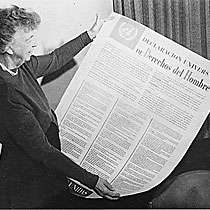Marking the 60th anniversary of the adoption of the Universal Declaration of Human Rights December 10, the United Nations honored individuals for outstanding work in preserving those rights. This year the honors were awarded posthumously to slain Pakistani leader Benazir Bhutto and Dorothy Stang, a nun murdered in Brazil three years ago who defended the human rights of poor indigenous farm workers, despite numerous death threats.
The United Nations' Universal Declaration of Human Rights is the most translated document in the world, according to the Guiness Book of World Records. Its creation was spearheaded by former U.S. first lady Eleanor Roosevelt and was designed to guarantee the political and civic rights of all people, including the right to freedom from torture, slavery, poverty, homelessness and other forms of oppression. The 1948 declaration was a product of a unique moment in history, when the horrors of World War II made the world aware of the sanctity of basic human rights.
(Photo: Eleanor Roosevelt holds a copy of the UDHR written in Spanish.)
Every five years the UN honors individuals working in the field of human rights to correspond to the anniversary of the declaration's adoption. Previous recipients of the UN Prize in the Field of Human Rights have included Nelson Mandela, Martin Luther King, Eleanor Roosevelt, Jimmy Carter and Amnesty International in recognition of their contribution to the promotion and protection of human rights and fundamental freedoms.
Additional winners this year' include Louise Arbour, Ramsey Clark, Carolyn Gomes, Denis Mukwege, and Human Rights Watch.
"As we mark the 60th anniversary of the Universal Declaration of Human Rights, we acknowledge the tireless work and invaluable contribution of these individuals and organizations that have fought to see the rights and freedoms embodied in this historic document become a reality for people in all corners of the world," said Assembly President Miguel D'Escoto.
Sr. Dorothy Stang of the Sisters of Notre Dame de Namur defended the human rights of the poor, landless and indigenous populations of the Anapu region of Brazil for nearly 40 years. She worked with farmers to help rebuild their livelihoods, cultivate their land and defend their rights from loggers and ranchers, whose threats never deterred her. She became a symbol of the fight to preserve the rainforest before being murdered in 2005 on her way to a meeting in the Amazon jungle.
Benazir Bhutto was was the first woman elected to lead a Muslim state having twice been Prime Minister of Pakistan (1988–1990; 1993–1996). Before her murder one year ago, she chaired the Pakistan Peoples Party (PPP), a centre-left political party in Pakistan and was campaigning for national office. Bhutto told journalists in Islamabad that her party, the PPP, would focus on "the five E's": employment, education, energy, environment, equality.
"These awardees constitute symbols of persistence, valour and tenacity in their resistance to public and private authorities that violate human rights. They constitute a moral force to put an end to systematic human rights violations," Mr. D'Escoto said in a press release issued November 26.
The human rights prize was first awarded on 10 December 1968 on the 20th anniversary of the adoption of the Universal Declaration of Human Rights and is awarded every five years to coincide with the date.
More About the Universal Declaration of Human Rights:
The Universal Declaration of Human Rights is not a treaty. However, because its purpose is to define the terms "fundamental freedoms" and "human rights" embedded in the U.N. Charter, all U.N. member nations are bound by it. Cox says the UDHR has acquired the force of international law and has bolstered human rights movements.
According to Article 25 of the UDHR, "Everyone has the right to a standard of living adequate for the health and well-being of himself and of his family, including food…" That is why it is considered a human rights violation for any government to prevent the distribution of humanitarian aid to any part of its population or to allow economic discrimination against any population group. (
UDHR info from Reuters.com)










Be the first to comment